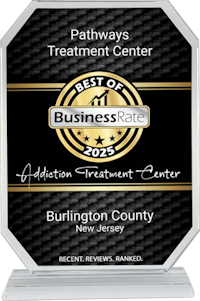Rehab For Meth Addiction in Burlington, New Jersey
Meth addiction is a serious problem, affecting individuals and communities across the United States, including New Jersey. Pathways Treatment Center helps people recover from methamphetamine addiction in a holistic manner, with comprehensive treatment programs to help individuals overcome their addiction and reclaim their lives. These programs also address co-occurring disorders as part of their holistic approach to treatment.
What is Meth?
Methamphetamine, commonly known as meth, is a powerful and highly addictive stimulant drug. It belongs to the amphetamine class of drugs and can be taken in various forms, including as a crystal or whitish-yellow powder.
Meth abuse affects the central nervous system, increasing dopamine levels in the brain, resulting in intense feelings of pleasure and euphoria. However, these pleasurable effects are short-lived. Repeated use of meth can lead to severe physical and psychological dependence, along with a host of detrimental mental health consequences.
One of the most alarming aspects of methamphetamine use is its impact on the user’s physical appearance. Prolonged meth use can cause severe skin issues, such as acne, sores, and skin infections. Additionally, the drug can lead to extreme weight loss and dental problems referred to as “meth mouth,” characterized by tooth decay, gum disease, and tooth loss.

Methamphetamine production poses significant environmental risks. The process of manufacturing meth involves the use of highly toxic chemicals that can contaminate soil, water sources, and air quality. Illegal meth labs not only endanger the health of those involved in production but also pose a threat to the surrounding community due to the potential for explosions and toxic fume exposure. Meth abuse doesn’t just affect the individual — the effects of the addiction echo out into their community and can cause much more destruction than a single person may realize.
Is Meth Different From Crystal Meth?
It is important to note that methamphetamine, the active ingredient in both meth and crystal meth, is a powerful stimulant that affects the central nervous system. When ingested, methamphetamine increases the release of dopamine in the brain, leading to intense feelings of euphoria and increased energy.
But prolonged meth use can have devastating effects on a person’s physical health. An addicted individual may suffer shame because of how the drug has affected them, and so they don’t seek help with meth detox. This continues the cycle of negative consequences to the point where intense assistance is required to rebuild the person’s life.
Signs of Meth Addiction
- Extreme weight loss
- Severe dental problems
- Insomnia and irregular sleep patterns
- Paranoia and hallucinations
- Aggressive and erratic behavior
- Reduced appetite
- Loss of interest in previously enjoyed activities
In addition to the visible signs of meth addiction listed above, individuals may also exhibit rapid speech, repetitive behaviors, and an increased heart rate. Long-term use of meth can result in severe health issues such as heart failure, memory loss, and cognitive impairments like attention deficit. Methamphetamine’s effect on a person’s body can lead to literal rewiring of the heart and brain. Its toxic composition can hinder and extend the recovery process, especially if the individual is also taking other drugs.
If you suspect that someone you know may be struggling with a meth addiction, it is essential to approach them with care and compassion, encouraging them to seek professional help. The therapeutic process for recovering from methamphetamine use disorder can be extensive, and it’s important to find a treatment provider that can address both the emotional and physical impact of meth addiction in the long term recovery process.
How to Help Someone with Meth Addiction
Here are some steps you can take to assist someone recovering from extended meth use:
- Express your concern and offer non-judgmental support
- Suggest professional help, such as rehab centers specializing in meth addiction treatment
- When they’re ready to discuss meth addiction treatment, help them research treatment options like individual therapy and group therapy
- Encourage them to advocate for their needs, whether it’s consistent company or medication-assisted treatment to help with physical symptoms
- Offer to accompany them to initial appointments or support group meetings
- Encourage healthy activities and hobbies as distractions
- Reinforce positive behavior and celebrate small victories

Remember, addiction is a complex issue. The road to sobriety and long-term recovery may be long and challenging. Offering consistent support and understanding can make a significant difference in a person’s journey towards overcoming meth addiction.
It’s important to educate yourself about the effects of methamphetamine on the body and mind. Meth addiction can be scary or intimidating due to its social implications. It is a highly addictive substance, and the consequences of the addiction can be very visible. It can also be associated with homelessness and crime, which can mean someone may have shame associated with being addicted to meth in particular. Understanding the cultural implications around meth can help you empathize with your loved one’s struggles and provide more effective support.
In addition to professional help, consider involving other trusted individuals in your loved one’s support system. This could include family members, close friends, or a therapist. By creating a network of support around the individual struggling with meth addiction, you can ensure they have multiple sources of encouragement and guidance. Encourage people to talk about their own struggles with substance abuse when relevant.
Treatment Options for Meth Addiction
- Intensive outpatient treatment (IOPs)
- Medication-assisted therapy
- Outpatient programs
- Sober living homes
Meth abuse requires comprehensive treatment options to address the needs of meth addicts. Combining various treatment modalities can increase the chances of successful recovery and long-term sobriety. If a person has an underlying mental illness, dual diagnosis treatment can help address the addiction while working within and around the mental health needs of the individual.
Inpatient rehabilitation programs, such as partial hospitalization programs (PHPS), offer a structured environment where individuals can receive intensive treatment and support to overcome their addiction. These programs often include individual therapy sessions, group counseling, educational workshops, and recreational activities to promote overall well-being.
Medication-assisted therapy, on the other hand, involves the use of medications such as bupropion or naltrexone to help reduce cravings and withdrawal symptoms associated with meth addiction. This approach, when combined with counseling and behavioral therapies, can significantly improve treatment outcomes and support individuals in their journey towards recovery.
Overcome Meth Addiction at Pathways Treatment Center
At Pathways Treatment Center, we understand that overcoming meth addiction is a challenging journey that requires personalized care and support. Our team of experts is committed to creating individualized treatment plans that address each client’s unique needs and circumstances. We believe in treating the whole person, not just the addiction, and our holistic approach focuses on healing the mind, body, and spirit.
Don’t let meth addiction control your life any longer. Reach out to Pathways Treatment Center today and take the first step towards lasting recovery and a brighter future.




